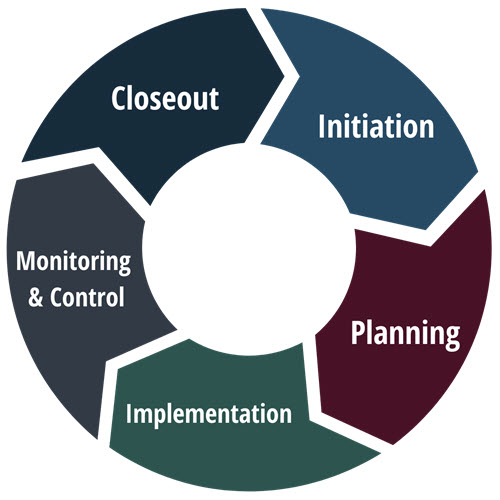Project management is the discipline of organising and managing resources (e.g. people) in such a way that the project is completed within defined scope, quality, time and cost constraints. A project is generally a temporary and one-time endeavour undertaken to create a unique product or service that brings about beneficial change or added value. A one-time undertaking contrasts with processes, or operations, which consist of permanent or semi-permanent ongoing functional work to create the same product or service over and over again. The management of these two systems is often very different and requires varying technical skills and philosophy, hence requiring the development of project management.
The first challenge of project management is to ensure that a project is delivered within defined constraints. The second, more ambitious challenge is the optimised allocation and integration of inputs needed to meet pre-defined objectives. A project is a carefully defined set of activities that use resources (money, people, materials, energy, space, provisions, communication, quality, risk, etc.) to meet predefined objectives.
Project management is quite often the province and the responsibility of an individual project manager. This individual seldom participates directly in the activities that produce the end result but rather strives to maintain the progress and productive mutual interaction of various parties in such a way that the overall risk of failure is reduced.
A project manager is often a client representative and has to determine and implement the exact needs of the client, based on knowledge of the firm he/she is representing. The ability to adapt to the various internal procedures of the contracting party, and to form close links with the nominated representative, is essential in ensuring that the key issues of cost, time, quality, and above all, client satisfaction, can be realised.
In whatever field, a successful project manager must be able to envisage the entire project from start to finish and must have the ability to ensure that this vision is realised.

It is pertinent at this point to distinguish between project, project management, technical processes and management processes.
Management processes are the processes that govern the operation of a system. Typical management processes include "Corporate Governance" and "Strategic Management".
Operational processes are processes that constitute the core business and create the primary value stream. Typical operational processes are Purchasing, Manufacturing, Marketing, and Sales.
Supporting processes, which support the core processes. Examples include Accounting, Recruitment, and Technical support.
Harold Kerzner, considered to be one of the leading authorities on project management, defines a project as any series of activities and tasks that...
- have a specific objective to be completed within certain specifications
- have defined start and end dates
- have funding limits (if applicable)
- consume resources (i.e., money, people, equipment)
Some other attributes that characterise a project include a singleness of purpose, a definite life cycle, complex interdependencies, some or all-unique elements and an environment of conflict.
Projects are usually unique in nature and vary considerably in size and duration. Compare the planning that needs to go into a large project such as the successful staging of the Olympic Games with that of a smaller project such as relocating offices. The costs involved in different projects also vary and large or small groups of people might be working on the project. Regardless of the nature and characteristics of any given project, the success of the project will invariably depend on the way in which it is managed.
Thus, projects differ from generic management primarily in that they have a specific endpoint, in terms of both product and time. Some authors also add that a project should be a unique, non-repetitive endeavour; that is, it should not be an activity that recurs.
The difference between a project and tasks/ non-project work can be described as follow:
- A project is typical of longer duration, has multiple contributors, and has multiple types of activity.
- Tasks are generally by one person, shorter duration, simple goal or set of goals, and a single type of activity.
Kerzner goes on to define project management as involving project planning and project monitoring and including such items as:
Project planning:
- Definition of work requirements
- Definition of the quantity of work
- Definition of resources needs
Project monitoring:
- Tracking progress
- Comparing the actual to the predicted
- Analysing impact
- Making adjustments
The importance of project work cannot be overstated in the current business environment. In a recent article, Tom Peters declared: “In the new economy, all work is project work. And you are projects!” (Peters, 1999, p.116). Peters feels strongly that projects should be more than just dreary assignments that are grudgingly accepted. As such, projects are avenues for people to show their talents and shine, turning the projects into vehicles that make others stand up and take notice. The tools of project planning and project monitoring are important contributors to making the project work a success and making it possible to impress others.
The various tools of project planning and project monitoring are closely tied. Planning clarifies the work to be accomplished and sets priorities for task completion. Planning involves scheduling – establishing timetables and milestones for completion. It also involves resource allocation – developing a budget that forecasts the amount of labour and equipment that will be needed. Alternatively, monitoring tracks progress to see whether the project is proceeding as planned. Is the schedule being adhered to? Are milestones being met? How likely is the project to be completed within, or even under, the projected budget? In the following sections, several key planning and monitoring tools will be presented. It should, however, be noted that the monitoring tools will be useful only if the planning has been conducted carefully and with sufficient attention to detail.